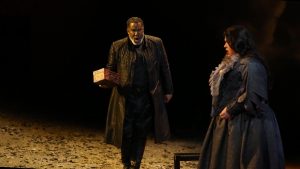Eric Owens
Description
With a voice and stage presence as big as his personality, Eric Owens is among the most celebrated bass-baritones in the opera world.
Featured Artists

Eric Owens is a celebrated bass-baritone opera singer who has appeared with the Metropolitan Opera, San Francisco Opera, English National Opera, the Berlin Philharmonic, and the Canadian Opera Company, among other major companies.
Born in Philadelphia in 1970, he studied piano and oboe before earning a BA in vocal performance at Temple University and a master’s degree from the Curtis Institute of Music. Known for his interpretations of both classical and modern opera, he made his debut at the Met in 2008 in the contemporary piece Doctor Atomic by John Adams. He received the 2011 Grammy Award for Best Opera Recording for a recording of this opera and the 2012 award for singing Wagner’s Ring cycle.
Owens is director of vocal studies at the Curtis Institute of Music.
Transcript
Eric Owens is one of the most celebrated bass-baritones in the opera today but he’s aware that sometimes what he hears and what the audience experiences can be very different.
Eric Owens: There is almost no self-awareness as to sonically what’s going on out there. There’ve been times when I thought, “Oh my God, that was terrible.” And people say, “Ah! That was amazing.”
Happily, Owens understands that a great performance requires him to transcend his surroundings.
Owens: I’m aware of when I am and I’m not in the moment and I know when you get into that zone and you’re listening and not worried about some note that’s 20 minutes down the pike. You’re just, someone’s talking and they’re talking to you and you’re listening to them. But you’ve got all that other stuff going on, too. It’s like, you know, it’s like I’m listening to the orchestra, too. I make sure I got my eye on the conductor in my periphery and you have to, I mean, the multi-tasking that goes on while you’re up there would just, like, totally blow people’s minds.
AJC: There’s an effortless quality to what you do. And I’m not saying that you don’t have to put a lot of effort into sounding the way you sound, but you sound like you don’t have to. You can do this first thing in the morning. When does that come along?
Owens: Oh goodness, I’m still tryin’ to get that together.
AJC: No!
Owens: Oh, I mean it’s, that feeling of it being effortless in the right places in your mechanism, that was a long time. That was a long road, just the idea of everything being as free as possible all up here and all of the work was happening here. And it took me quite a while to sort that all out.
AJC: But you are naturally, you’re singing in your natural speaking range. I mean, I’ve spoken to—
Owens: Right.
AJC: There are basses who walking around who speak—
Owens: Higher.
AJC: Well, they speak tenor and they sing basso.
Owens: Right, right. Right.
AJC: But you’re…
Owens: But I’m—
AJC: This is your natural place.
Owens: This is my voice. And all I need to do is slow this down to start singing. There’s not really a gear shift that needs to take place. I tell students sometimes, I said it’s like in The Music Man, it’s like: ice cream. Yes, singing is just sustained talking. And it’s easier for, I guess for lower voices, but—
AJC: Yeah. Because also there’s less energy, right? To hit a really high note on a high range?
Owens: I think one needs to not feel like it’s something that they have to hammer away at or that it’s a struggle to get up there because if you think it’s a struggle it’s going to be and then you start doing all of these things and you take this breath that’s, “Okay, damn it, I’m gonna.” You know, and the best thing you can do is just, and just let it out.
AJC: Let it out.
Owens: And that’s one of the hardest things, though. I mean, in life. Being simple. Simplicity doesn’t mean easy.
AJC: It’s not easy.
Owens: And it doesn’t mean uninteresting either.
And if contending with the sheer volume of full orchestra seems daunting, you’re right. It took some time for Eric Owens to evolve his technique.
Owens: The natural tendency is to try to—
AJC: Sing over them.
Owens: Right. And that’s the worst thing ever, especially if it’s something dramatically intense and if your character’s angry and you have to convey that anger through the text without it going to your voice and becoming a shouting match. And that’s hard to accomplish at times. I mean, even now I’m still trying to. It’s like, Eric. The worst thing you could try to do is try to—
AJC: Out-sing an orchestra.
Owens: Right, “Bull in a china shop” your way through this orchestra.
AJC: So how do you do it, then?
Owens: The best thing to do—
AJC: You go low and let them react to you.
Owens: Well, I tell ya… The more you just let it flow unencumbered and sing it like you sing Mozart or Bach, it’s gonna carry over the orchestra and it’s counterintuitive. You know, where less is more.
But Eric Owens is well aware that in this day and age his artistic obligations don’t end when he leaves the stage.
Owens: Here lately I think you need to go above and beyond, not simply because you’re trying to further career, but simply because the arts are in a state where, you know, the status quo isn’t going to cut it.
And so, Eric Owens continues to devote all of himself to the art form he loves.

